| Srl | Item |
| 1 |
ID:
179337
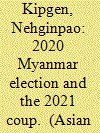

|
|
|
|
|
| Summary/Abstract |
In the 2020 general election, the National League for Democracy (NLD) won 920 of the total 1,117 seats, which was upped by 61 seats from its win in the 2015 election. The main opposition party, the Union Solidarity and Development Party (USDP), won 71 seats, down 46 from the 2015 election when it won 117 seats. The election result gave a strong mandate to the NLD for another five years. On the other hand, the USDP accused the NLD of engaging in electoral fraud including the buying of votes, and called for fresh elections in coordination with the military. Following a complaint from its proxy party, the USDP, the military initially said it would conduct an investigation in 218 townships where the military personnel and their family members cast their votes, which it expanded to 314 townships in all states and regions across the country; this finally led to the declaration of a state of emergency rule (the military coup) on 1 February 2021. Ethnic parties also alleged that the NLD government made certain pre-poll decisions that disadvantaged the ethnic minorities. This paper analyzes the electoral process and its outcome in an attempt to understand whether the election led to the deepening of democracy or the widening of division in the country's democratization process.
|
|
|
|
|
|
|
|
|
|
|
|
|
|
|
|
| 2 |
ID:
145092
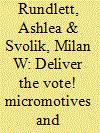

|
|
|
|
|
| Summary/Abstract |
Most electoral fraud is not conducted centrally by incumbents but rather locally by a multitude of political operatives. How does an incumbent ensure that his agents deliver fraud when needed and as much as is needed? We address this and related puzzles in the political organization of electoral fraud by studying the perverse consequences of incentive conflicts between incumbents and their local agents. These incentive conflicts result in a herd dynamic among the agents that tends to either oversupply or undersupply fraud, rarely delivering the amount of fraud that would be optimal from the incumbent’s point of view. Our analysis of the political organization of electoral fraud explains why even popular incumbents often preside over seemingly unnecessary fraud, why fraud sometimes fails to deliver victories, and it predicts that the extent of fraud should be increasing in both the incumbent’s genuine support and reported results across precincts. A statistical analysis of anomalies in precinct-level results from the 2011–2012 Russian legislative and presidential elections provides preliminary support for our key claims.
|
|
|
|
|
|
|
|
|
|
|
|
|
|
|
|
| 3 |
ID:
165453
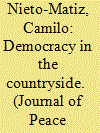

|
|
|
|
|
| Summary/Abstract |
What are the subnational variations of violence against voters? This article studies the effect of land concentration on electoral violence in the context of armed conflict in Colombia. My central argument is that electoral violence tends to be higher in municipalities where landowners are a relevant social actor. More concretely, in areas where violent groups dispute territorial control, higher levels of land inequality – a proxy for landowner prominence – have a positive effect on electoral violence. However, actors do not make the simple choice between violence or no violence but may also resort to fraudulent tactics. Because electoral fraud requires greater cooperation and coordination with the state, I argue that violent groups with stronger links to state officials and political elites are more likely to engage in fraudulent tactics compared to anti-government actors. To estimate the effect of land inequality on electoral coercion and fraud, I exploit the levels of soil quality as an instrumental variable for land concentration in Colombia between 2002 and 2011. This article contributes to the literature on the politics of land inequality; elections and electoral manipulation; and the use of violence in democratic settings.
|
|
|
|
|
|
|
|
|
|
|
|
|
|
|
|
| 4 |
ID:
147950
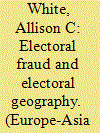

|
|
|
|
|
| Summary/Abstract |
Despite United Russia’s (Edinaya Rossiya—UR) dominance in repeated Russian legislative elections, the correlates of the party’s electoral support remain noticeably understudied beyond the influence of electoral manipulation. I pinpoint the specific contours of UR’s strongholds in the two most recent parliamentary elections in Russia—2007 and 2011—focusing on raion- and regional-level correlates of the vote using an original dataset. UR has been undergirded by geographically concentrated ethnic minorities and the countryside, and these patterns of support have persisted even in the absence of fraud, suggesting that the dominant party’s electoral windfalls cannot be attributed solely to electoral malfeasance.
|
|
|
|
|
|
|
|
|
|
|
|
|
|
|
|
| 5 |
ID:
178722
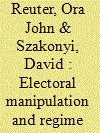

|
|
|
|
|
| Summary/Abstract |
Does electoral fraud stabilize authoritarian rule or undermine it? The answer to this question rests in part on how voters evaluate regime candidates who engage in fraud. Using a survey experiment conducted after the 2016 elections in Russia, the authors find that voters withdraw their support from ruling party candidates who commit electoral fraud. This effect is especially large among strong supporters of the regime. Core regime supporters are more likely to have ex ante beliefs that elections are free and fair. Revealing that fraud has occurred significantly reduces their propensity to support the regime. The authors’ findings illustrate that fraud is costly for autocrats not just because it may ignite protest, but also because it can undermine the regime’s core base of electoral support. Because many of its strongest supporters expect free and fair elections, the regime has strong incentives to conceal or otherwise limit its use of electoral fraud.
|
|
|
|
|
|
|
|
|
|
|
|
|
|
|
|
| 6 |
ID:
090821
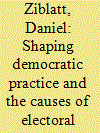

|
|
|
|
|
| Publication |
2009.
|
| Summary/Abstract |
Why is there so much alleged electoral fraud in new democracies? Most scholarship focuses on the proximate cause of electoral competition. This article proposes a different answer by constructing and analyzing an original data set drawn from the German parliament's own voluminous record of election disputes for every parliamentary election in the life of Imperial Germany (1871-1912) after its adoption of universal male suffrage in 1871. The article analyzes the election of over 5,000 parliamentary seats to identify where and why elections were disputed as a result of "election misconduct." The empirical analysis demonstrates that electoral fraud's incidence is significantly related to a society's level of inequality in landholding, a major source of wealth, power, and prestige in this period. After weighing the importance of two different causal mechanisms, the article concludes that socioeconomic inequality, by making elections endogenous to preexisting social power, can be a major and underappreciated barrier to the long-term process of democratization even after the "choice" of formally democratic rules.
|
|
|
|
|
|
|
|
|
|
|
|
|
|
|
|
| 7 |
ID:
086979
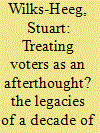

|
|
|
|
|
| Publication |
2009.
|
| Summary/Abstract |
Over the past decade, the UK's New Labour government has been at the forefront of efforts internationally to modernise electoral procedures, promising to deliver 'an e-enabled, multi-channel general election by 2006'. This paper considers the origins and the impacts of reforms to UK electoral procedures with a particular focus on the adoption of postal voting on demand and pilots of electronic voting and counting since 2000. The paper concludes that the principal legacy of the modernisation agenda to date is likely to have been a negative impact on public confidence in the electoral process.
|
|
|
|
|
|
|
|
|
|
|
|
|
|
|
|